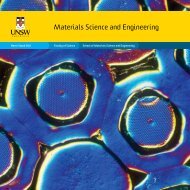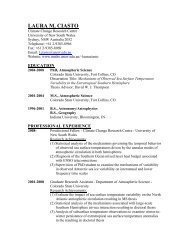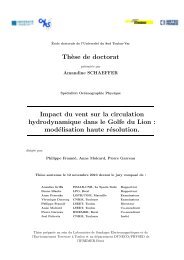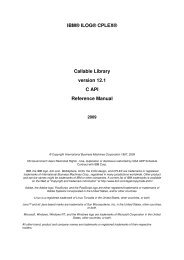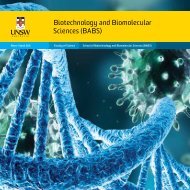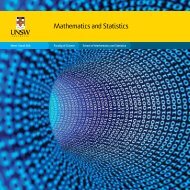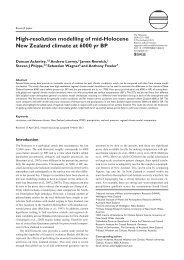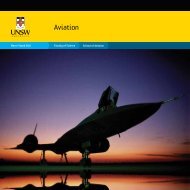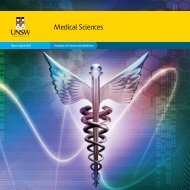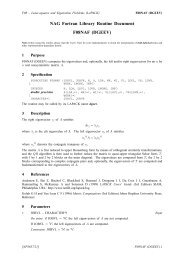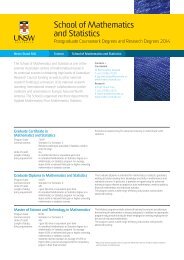2011 Postgraduate Research Competition - UNSW Science - The ...
2011 Postgraduate Research Competition - UNSW Science - The ...
2011 Postgraduate Research Competition - UNSW Science - The ...
Create successful ePaper yourself
Turn your PDF publications into a flip-book with our unique Google optimized e-Paper software.
Page |31<br />
Erasing traumatic memories<br />
Wan Yee Chan and Gavan McNally<br />
School of Psychology<br />
Abstract<br />
Disorders of fear and anxiety impose a significant burden on individual sufferers, their families,<br />
and communities. Existing treatments for such anxiety are effective but anxiety is prone to<br />
relapse after treatment. <strong>The</strong>re is a pressing need for new approaches to treat anxiety and to<br />
reduce relapse following such treatment. One such approach is to exploit the recent finding<br />
that memories are continuously being destabilized, updated, and reconsolidated.<br />
Approaches which augment traumatic memory destabilization or interfere with<br />
reconsolidation may cause that memory to be lost forever. <strong>The</strong>se approaches will produce a<br />
fear loss which is more long lasting and less sensitive to relapse. <strong>The</strong> research presented here<br />
addressed this possibility in three experiments using an animal model for the treatment of fear<br />
and anxiety. <strong>The</strong> results show that destabilizing a fear memory prior to fear reduction<br />
treatment produces a deeper or greater fear loss than is observed when fear reduction<br />
treatments are conducted in the absence of such destabilization. <strong>The</strong>se findings suggest that<br />
memory destabilization and reconsolidation processes may be useful targets in the<br />
development of novel approaches to treat anxiety and fear.<br />
Social Cognitive Deficits in Schizophrenia:<br />
A Psychophysiological Examination of Potential<br />
Underlying Mechanisms<br />
Abstract<br />
Kandice Varcin, Julie Henry and Simon Killcross<br />
School of Psychology<br />
Social cognition broadly refers to the means by which individuals perceive, interpret and<br />
process information in social contexts. In schizophrenia, social-cognitive impairment is a<br />
replicable finding, and has been linked to poor social functioning. <strong>The</strong>se social difficulties are<br />
largely refractory to pharmacological intervention and are amongst the most disabling<br />
features of this disorder. It is therefore important to delineate the mechanisms underlying<br />
social-cognitive abnormalities in this group in order to identify appropriate targets for<br />
remediation. In non-clinical individuals, the tendency to spontaneously and rapidly<br />
synchronise facial expressions with observed expressions has been consistently linked to<br />
social-cognitive function. By using facial electromyography (a sensitive measure of subtle<br />
changes in facial muscle activity), my research was the first to show that individuals with<br />
schizophrenia do not demonstrate this rapid facial mimicry response (Varcin, Bailey & Henry,<br />
2010). My research has also demonstrated that rapid facial mimicry is not a mere motormatching<br />
response (whereby observing a facial expression automatically elicits a matching<br />
muscular response); instead, my research has shown that rapid facial reactions reflect<br />
emotional processes (Varcin, Henry, Bailey, & Richmond, submitted). Taken together, these<br />
findings suggest that disrupted rapid emotional responding may be one mechanism<br />
contributing to social-cognitive impairment in schizophrenia.<br />
|living well + ageing well



